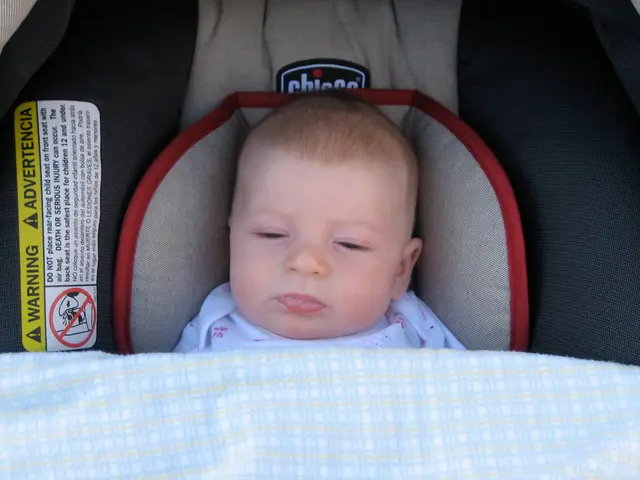Is It Safe to Consume Alcohol While Nursing Infants?
Enjoying a drink while breastfeeding? Here's what you need to know to keep everyone safe and satisfied.
A bright sunny day calls for a refreshing beverage, but if you're breastfeeding, you might worry about the impact of alcohol on your little one. The good news is, with careful planning and responsible drinking, you can still enjoy a brewsky or two without compromising your baby's well-being.
According to Obstetrician Kathryn Newton, MD, it's all about timing and moderation. "You can consume some alcohol if you know how to time it and how much you can safely consume," she advises.
Moderation Matters
Heed the advice of the Dietary Guidelines for Americans, which recommends limiting alcohol consumption to no more than one drink per day. However, it's essential to understand that "one drink" isn't always one glass.
One standard drink consists of:
- 12 oz. of 5% ABV beer (about one can)
- 8 oz. of 7% ABV malt liquor (around the size of a standard drinking glass)
- 5 oz. of 12% ABV wine (one glass)
- 1.5 oz. of 40% ABV (80-proof) liquor (one shot)
Keep in mind that the alcohol content (ABV) of drinks can significantly affect their potency. For instance, a 12-ounce glass of 9% ABV beer is considered the equivalent of two drinks, not one.
When to Wait It Out
The human body takes about two hours to metabolize one drink. But what does "metabolize" mean, exactly? Simply put, it's the time your body needs to break down and eliminate the alcohol from your system. Once you've metabolized the alcohol, it's out of your breast milk, too.
So, if there's still alcohol in your system, there's still alcohol in your breast milk. Stick to nursing only when you feel "neurologically normal" - not at all tipsy or buzzed. This translates to waiting two hours after one drink and four to five hours after two drinks.
Breastfeeding vs. Blood Alcohol Content
The level of alcohol in your milk mimics the amount in your blood. If your blood alcohol content is 0.10%, your breast milk will be the same. As your blood alcohol content drops, so does the concentration in your breast milk.
Alcohol's Impact on Babies
Babies' smaller bodies process alcohol slower than adults, so nursing them too soon after drinking can result in them consuming alcohol through your breast milk. While babies likely won't get drunk, excessive exposure to alcohol can have negative effects, such as developmental and neurological problems, sleep issues, or troubles in gaining weight.
When Pumping Isn't the Solution
You may have heard of the "pump and dump" method, which involves pumping breast milk and discarding it after drinking. However, the U.S. Centers for Disease Control and Prevention (CDC) advises that pumping and dumping isn't a quick fix for removing alcohol from your breast milk.
So, waiting the appropriate time is still crucial before nursing your baby, even if you've pumped in the meantime. Pumping and dumping can be helpful in relieving engorgement during longer drinking sessions, but the milk should still be discarded due to its unsafe alcohol content.
Breast Milk Production and Alcohol
If you're afraid that occasional alcohol consumption will affect your ability to produce breast milk, there's usually no need to worry. Having the occasional drink once or twice a week won't significantly impact your milk supply or letdown reflex.
However, regularly consuming alcohol can negatively affect both your milk supply and your letdown reflex. This can result in the baby receiving less milk than usual. If you feel that your alcohol consumption has become more frequent or is interfering with your breastfeeding, it's essential to consult your healthcare provider for guidance.
The Final Sip
While it's always better to avoid alcohol altogether, we understand that societal norms may make this difficult. In such cases, maintaining a moderate intake and waiting the proper time before nursing your baby can help ensure a safe experience for both of you. If you have any questions or concerns, don't hesitate to speak with your healthcare provider for advice tailored to your situation.
Cheers to responsible, enjoyable drinking during breastfeeding!
[1] "Alcohol and Breastfeeding" (Mayo Clinic)[2] "Frequently Asked Questions About Alcohol Use During Pregnancy and Breastfeeding" (National Institute on Alcohol Abuse and Alcoholism)[3] "Alcohol Use in Breastfeeding Mothers" (American Family Physician)[4] "Breastfeeding and Returning to Work: A Guide for Employers" (U.S. Department of Health and Human Services)[5] "Proper Pours" (PourMyBeer)
- After consuming a drink, ensure a safe nursing experience by waiting for the alcohol to metabolize fully. Generally, a two-hour wait is adequate for one drink, while a four to five-hour wait is recommended for two drinks.
- To maintain the well-being of your baby and overall health, heed the Dietary Guidelines for Americans and limit daily alcohol consumption to one drink, carefully considering that a standard drink consists of specific measures of beer, malt liquor, wine, and liquor.
- In the realm of health-and-wellness, women should consider their parenting responsibilities when it comes to alcohol consumption. Be mindful that alcohol negatively impacts a baby's development and may lead to problems such as sleep issues, difficulties in gaining weight, and potential neurological problems.
- Furthermore, it's important to recognize that occasional alcohol consumption while breastfeeding shouldn't significantly affect your milk supply or letdown reflex, but continued regular drinking may have adverse effects on both. Thus, if you find that alcohol consumption is becoming more frequent or interferes with breastfeeding, consult your healthcare provider for guidance.








